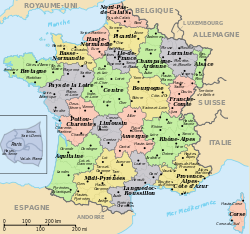French food
French food has influenced the style of cooking throughout Europe, and its chefs work in restaurants throughout the world.[1]
The roots of modern haute cuisine lie in chefs like La Varenne (1615–1678) and the notable chef of Napoleon, Marie-Antoine Carême (1784–1833). These chefs developed a lighter style of food compared to the food of the Middle Ages. They used fewer spices, and more herbs and creamy ingredients.
Typical ingredients like roux and fish stock, and techniques such as marinading, and dishes such as ragout, were invented. Carême was an expert pâtissier (pastry-maker), and this is still a mark of French cooking. He developed basic sauces, his 'mother sauces'; he had over a hundred sauces in his repertoire, based on the half-dozen mother sauces.
French cooking was introduced in the 20th century by Georges Auguste Escoffier (1846–1935). He was a genius at organisation. He worked out how to run large restaurants, as in a big hotel or a palace: how the staff should be organised; how the menu was prepared. He had methods for everything, and may have invented over 5,000 recipes.[2] Escoffier managed the restaurants and cuisine at the Savoy Hotel and Carlton Hotel in London, the Hôtel Ritz Paris, and some of the greatest cruise ships of the day.
Escoffier's other main contribution was the publication of Le Guide Culinaire in 1903, which spread the understanding of French cookery. However, Escoffier left out much of the culinary character to be found in the regions of France.
Gastro-tourism and the Guide Michelin helped to acquaint people with the rich bourgeois and peasant cuisine of the French countryside in the 20th century. Gascon cuisine has also had great influence over the cuisine in the southwest of France. Many dishes that were once regional have proliferated in variations across the country. Cheese and wine are a major part of the cuisine, playing different roles regionally and nationally.[3][4][5] In the north of France, people often prefer to use butter to cook. In the south, they prefer olive oil and garlic.[6] In France, each region has its own special dish; choucroute in Alsace, quiche in Lorraine, cassoulet in the Languedoc-Roussillon, tapenade in Provence-Alpes-Côte d'Azur, tartiflette in Savoie, and bouillabaisse in Marseille, just to name a few.
In November 2010, French gastronomy was added by UNESCO to its lists of the world's 'intangible cultural heritage'.[7][8]
French Food Media
A nouvelle cuisine presentation
French haute cuisine presentation
- French taste of wines.JPG
French wines are usually made to accompany French cuisine.
- Marie Leszczyńska, reine de France (original copy) by Jean-Marc Nattier.png
The Polish wife of Louis XV of France, Queen Marie Leszczyńska, influenced French cuisine.
- M-A-Careme.jpg
Marie-Antoine Carême was a French chef and an early practitioner and exponent of the elaborate style of cooking known as grande cuisine
- Auguste Escoffier 01.jpg
Georges Auguste Escoffier was a French chef, restaurateur, and culinary writer who popularized and updated traditional French cooking methods
The 22 regions and 96 departments of metropolitan France include Corsica (Corse, lower right). Paris area is expanded (inset at left).
- Jean François Tourcaty, Carte Gastronomique de la France, 1809 Cornell CUL PJM 1033 01.jpg
"Carte Gastronomique de la France" belong to the outset of the "Cours Gastronomique" by Charles Louis Cadet de Gassicourt (1809).
- Grand sechoir.jpg
Grand sechoir, Museum of the Walnut in Vinay, Isère
References
- ↑ "Diversity of French Cuisine". Archived from the original on 23 July 2010. Retrieved 1 August 2010.(in French)
- ↑ "Our History | Auguste Escoffier School of Culinary Arts". Escoffier. Retrieved 2024-11-29.
- ↑ "French Cheeses". Retrieved 1 August 2010.
- ↑ "French Cheese". Archived from the original on 27 August 2010. Retrieved 1 August 2010.
- ↑ "The world's best cuisines". Archived from the original on 26 July 2010. Retrieved 1 August 2010.
- ↑ "Butter and oil in French Cuisine". Archived from the original on 25 April 2011. Retrieved 1 August 2010.
- ↑ Bon appétit: Your meal is certified by the U.N. Archived 2010-11-20 at the Wayback Machine Dallas Morning News
- ↑ Celebrations, healing techniques, crafts and culinary arts added to the Representative List of the Intangible Cultural Heritage
